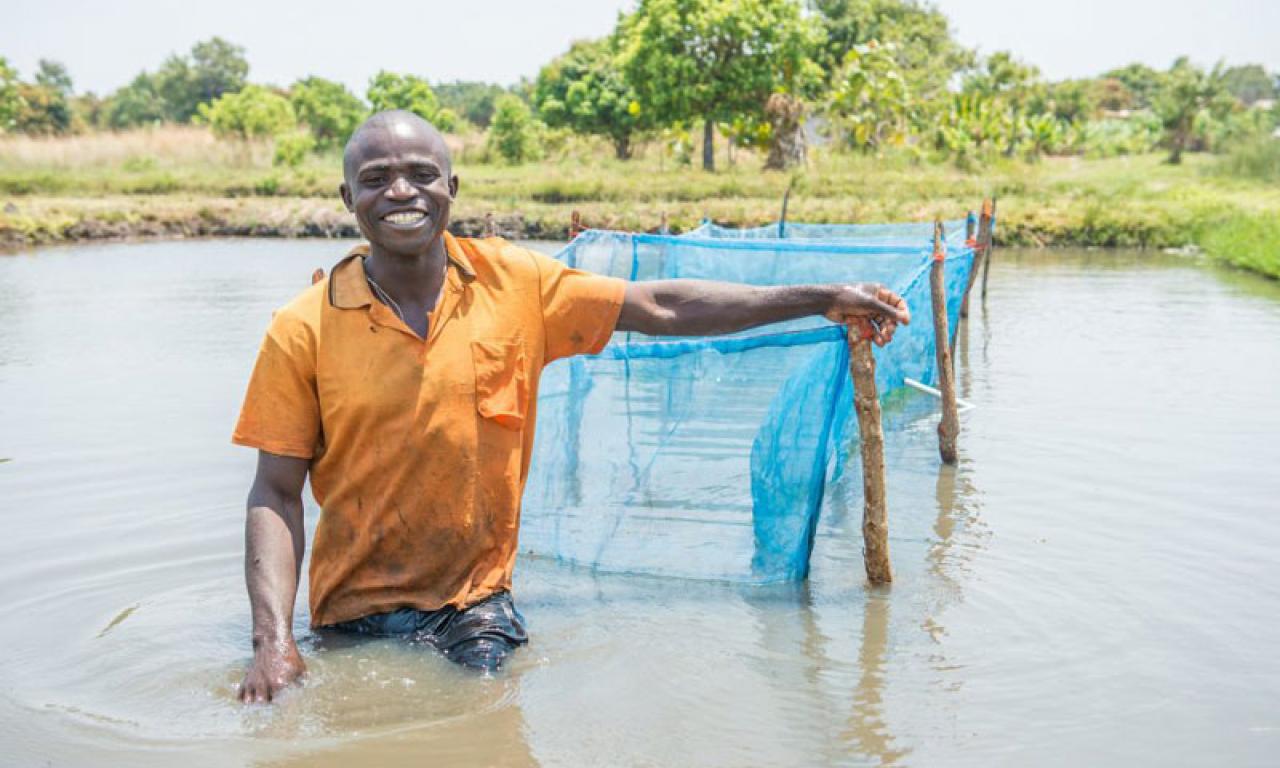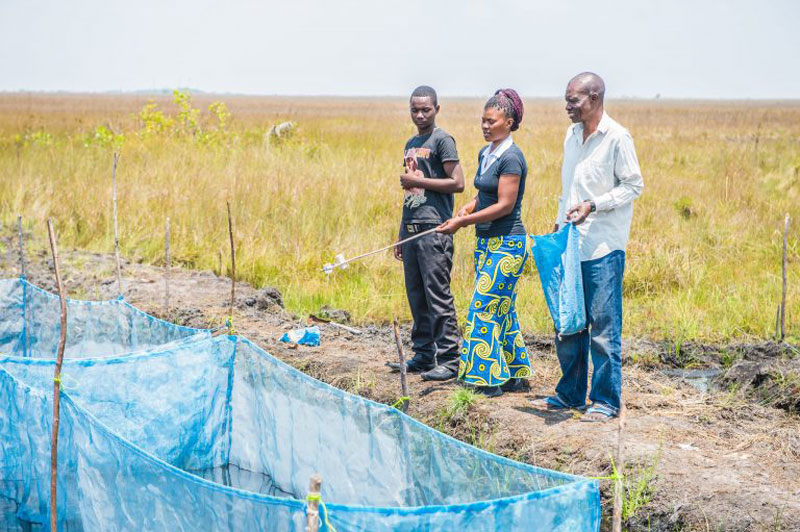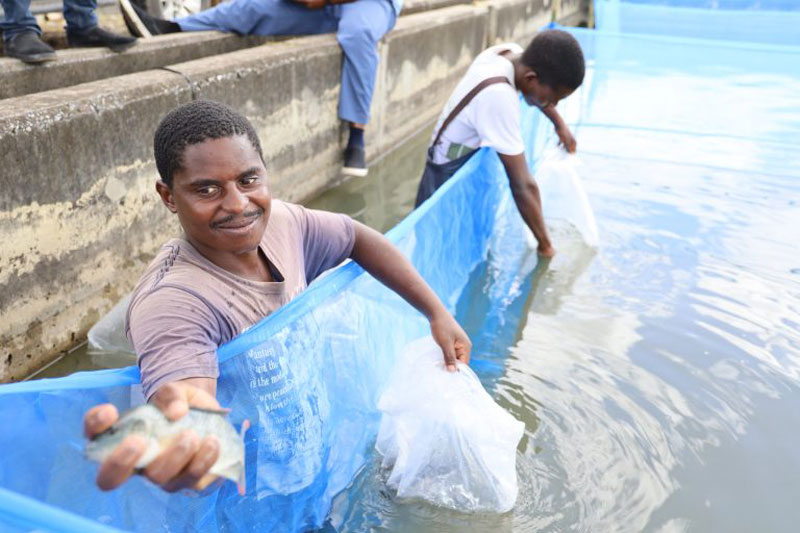
Northern Zambia’s growing small-scale aquaculture sector offers new opportunities to improve food and nutrition security and boost income. The full potential of rural smallholder farms can be realized through investment in key inputs and markets along aquatic food value chains. Building the capacity of small to medium-sized businesses that supply aquaculture operations is one proven way to transfer new technologies and knowledge to smallholder fish farmers.
Northern Zambia’s growing small-scale aquaculture sector offers new opportunities to improve food and nutrition security and boost income. The full potential of rural smallholder farms can be realized through investment in key inputs and markets along aquatic food value chains. Building the capacity of small to medium-sized businesses that supply aquaculture operations is one proven way to transfer new technologies and knowledge to smallholder fish farmers.
Rural fish farmers are often unable to obtain the resources and extension services needed to boost their productivity and resilience. The most constraining factors are a lack of access to quality fish feed and fingerlings. Fish fingerlings are the immature fish needed to stock ponds to jumpstart fish production; quality fish feed is necessary to rear healthy stocks by providing adequate nourishment.
Large private corporations involved in the aquaculture sector, including fish feed and fish fingerling producers, are based in the cities Lusaka and Siavonga. The long distance from these urban areas to remote northern provinces, coupled with farmers’ low use of commercial feed, leads to a lack of interest in major corporate investment along smallholder value chains.
Seeking innovative solutions, researchers found small and medium-sized enterprises (SMEs) to be a suitable vehicle for market linkages and knowledge and skills transfer. As SMEs already provide employment to 88 percent of Zambia’s population, they remain a viable leverage point for capacity development interventions.
WorldFish partnered with Musika, a nonprofit working in agricultural markets, to link smallholder fish farmers to local small and medium-sized businesses that provide them with the necessary inputs and expertise. Researchers utilized private sector investment to further develop aquatic food value chains and fill the identified gaps in resource availability.
As part of the Aquaculture Technical, Vocational, and Entrepreneurship Training for Improved Private Sector and Smallholder Skills project (AQ TEVET), capacity development initiatives targeted small to medium-sized business enterprises in order to boost productivity in the smallholder aquaculture sector. Funded by NORAD, the project works to develop private-public partnerships that invest in key production inputs and disseminate novel technologies and training to smallholder fish farmers.
Boosting productivity with new business models

In a census conducted in Northern and Luapula Provinces, WorldFish researchers found that 29 percent of smallholder farmers had given up fish farming, evidenced by a significant number of abandoned ponds. Interviewees noted that many farmers had abandoned their ponds due to poor productivity, citing a lack of technical knowledge, limited access to extension services, and undeveloped market linkages.
To improve the productivity of smallholder farmers, WorldFish provided small to medium-sized business operators with technical expertise on site selection, pond preparation, fish stocking, and business management. The business operators then applied their newly acquired knowledge to train rural farmers and provide them with operational inputs, offering adequate supplies of quality fish feed and fingerlings.
By developing the capacity of small and medium-sized enterprises, fish farmers subsequently benefit. Business operators require a certain number of successful farmers for their business to become viable—an incitement that leads them to provide continuous training and resources to small-scale aquaculture producers.
In under a year, WorldFish and partners have developed the capacity of three SMEs: Kasakalabwe Multipurpose Cooperative, Triple Blessings, and Hopeways. These SMEs work to reach isolated farmers with extension services aimed at increasing fish production and efficiency.
Since 2020, the fish hatchery operator Hopeways has trained 60 fish farmers and produced 90,000 fish fingerlings, supplying smallholder aquaculture operations across the Northern Province.
Following technical training provided under AQ TEVET, Kasakakalabwe Multipurpose Cooperative was certified by the Zambia Bureau of Standards as a catfish hatchery operator. It has since renovated 36 fish ponds and traveled over 200km to deliver catfish fingerlings to isolated farmers. By offering certified seed and considerable extension services, the enterprise has experienced a surge in demand.
“We provide extension services to farmers to grow our business. We can produce 400,000 catfish fingerlings every month; therefore, we need enough clients to purchase the fingerlings,” said Felix Mulenga, manager of Kasakakalabwe Cooperative.
Mulenga noted that the more extension services they provide, the more their business grows. The group recently traveled to the palace of His Royal Highness Paramount Chief Chitimukulu Kanyanta Manga Sosala’s to converse with farmers interested in catfish production but who first wanted training and access to quality fingerlings.
Building the capacity of small to medium-sized business enterprises lays the foundation for growth of the smallholder aquaculture sector, said Reuben Banda, the Managing Director for Musika.
Diverse benefits along value chains

Access to high-quality fish fingerlings and commercial feed, coupled with newly acquired technical skills, has helped fish farmers boost their production and income while providing financial benefits to small and medium-sized business enterprises.
Adsek was one local business that has benefited from the scheme. The family-run fish feed supplier business, operated by Mubanga Seketeni, received training from WorldFish and Musika, and now provides technical support to the surrounding farming community.
“As a result of the training we provided to farmers, we have increased fish feed sales from zero bags to about three 25k bags every week. The sales represent a big increase, and we anticipate that as we train more farmers, the demand for fish feed will keep increasing,” said Seketeni.
Since training and extension services have reached rural communities, a number of farmers have revived their idle ponds. They have applied their new skills and knowledge to modernize pond layouts, update feeding regimens, and distinguish between desirable and undesirable fish species.
Gloria Chitoshi Musemiwe, a fish farmer in Luapula Province, explained that members of her cooperative, who had previously abandoned fish farming, had restarted farming operations after receiving training. After her own training in October 2020, Musemiwe spent 1500 kwacha, approximately 70 USD, to purchase quality fingerlings and commercial fish feed.
“I am making a lot of progress with fish farming. I will continue to buy high-quality feed because our trainers said that if we follow the feeding protocol, we can harvest in six months and make a sizeable profit,” said Musemiwe.
Increasing the profits and productivity of smallholder fish farmers will improve livelihoods across the country. When farmers have access to extension services, knowledge, and resources, they invest in their farming business—and diverse actors along aquatic food value chains can reap the benefits.

